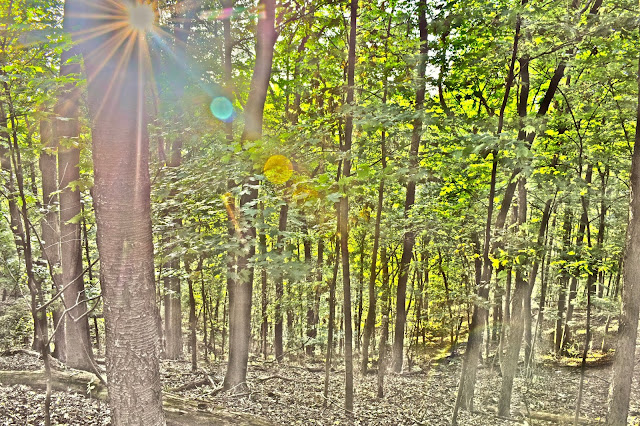I suppose we know (don’t we?) that following the law with resentment isn’t right or good. It’s really not keeping the Law at all. Because in the final rule, the Law is Love. And, at some point, it seems good and right to realize that we’re most unlikely to find our love for God through clenched teeth, pouting like a two-year-old as if we’re having to follow laws that keep us from having fun. Even trying to believe (like adults do) that we know the constraints are for our own good won’t work. This, too, separates us from Love. And it won’t work to play hermeneutical word-games so that a law gets to be whatever we want it to be. It’s not the Law that has to change—it’s the world we live in that spins. “Imaginal,” not imaginary, is a possible name for this, transmuting “idols into icons.”
Sometimes a bit of fog brings appreciation for light, the subtle beauty of it; it’s more than perfect clarity. The opening pages of Tom Cheetham’s Imaginal Love: The Meanings of Imagination in Henry Corbin and James Hillman point into this phoenix, this shifting spectrum that moves us through construction/deconstruction/(re-)creation of reality, cosmos, earth, and heaven.
“It is perhaps the chief merit of Corbin that he can help us, in his own words, to ‘transmute idols into icons’ and so defuse the destructive power of literalism and fundamentalism at the heart, in the imagination. To anticipate: Corbin was a master of the visionary recital, the dramatic narrative, and if we understand what this truly means then we will come to see that Fiction in this great sense is the repository of all knowledge, and all truth. Literal truth is always false…In reality, fiction is the only possible means of expressing the truth…” (pp. 14-15).
As I’m reading into this work of Cheetham, I feel my grounding become a bit tenuous; and while excited in perceiving from his writing a better bridge between Jung and Sufism, I sense more certain positioning as I reach back toward Chittick’s explication and translation of Ibn al-’Arabi (Sufi Path of Knowledge). It seems I’m venturing into remaking my “lived experience” and re-mapping the “real world” with textures of soul and spirit so that the imaginal world revolutionizes the feeling of certainty. Strangely (or not, as I see a similar reporting in Cheetham’s narrative of his journey from secular rationalism to spiritual pragmatism), while reading Chittick (as the current engine in a long train including Corbin’s Creative Imagination and many other challenging texts as well as life experiences and simply getting older) slowly in order to allow it to absorb into dreams and reflections, something redemptive is happening with the Law.
Instead of succumbing to and indulging in the typical defensiveness that accompanies being confronted with religious laws, I’m taking a few deep breaths, relaxing shoulders, neck, and stomach. With guidance from the masters, let’s imagine the Law not as a burden but instead as a ladder for the spiritual pathway.
“Again we are brought back to the fundamental human imperative: Man is bound by the reality of his own essence to strive after God, who is Good, Light, Knowledge, Being—everything to which he must conform in order to reach his own happiness and felicity. But God is unknown and unknowable, so the only way to reach Him is to follow the Law as He makes it known to us” (p. 291, Chittick).
Instead of fearing the loss of each person’s individual fingerprint identity and destiny, let’s hold in remembrance it’s all given by God, of course. The same Source provides this gift of uniqueness as well as the Law capable of providing unique guidance to the Unity. To us, it may often feel paradoxical: the many and the One. Thus the need for the truth of an imaginal world.
From the time man begins to climb the ladder of ascent (mi’raj), he receives divine self-disclosure in accordance with the ladder of his ascent. Each individual among the Folk of Allah has a ladder specific to him which no one else climbs…However, all the steps of the meanings for the prophets, the friends, the faithful, and the messengers are the same… (pp. 218-219, Ibn al-’Arabi translated by Chittick)
Let’s not expect cheap grace. Stepping on this ladder demands all:
“When man renounces his own individual desire, shrinks from his own ego, and prefers his Lord over all else, then God sets up before him in place of the form of his own soul the form of a divine guidance, a real form from the Real, so that he may walk proudly in diaphanous capes of light. This form is the Law of his prophet and the messengerhood of his messenger. It casts to him from his Lord that within which lies his felicity. (p. 252, Ibn al-’Arabi translated by Chittick)
The call of the spiritual pathway is freedom from imprisonment in idol-worship, both lawlessness as well as false conceptions of the Law. God’s Law is not a one-size-fits-all straitjacket. Failure to grow beyond the literalism of limited conceptions may enforce dogmas that fit the ego-mind but feel cold and harsh. To grow isn’t to become free from the Law but to become free from the ego, to move from a fear-based narrowness, from violent exclusiveness, from joyless rigidity as well as reckless indulgence and addiction, and instead to flow into the imaginal world, the Love.



